Feeding Ferrets
Ferrets are true carnivores and cannot handle a diet containing more than 4% fiber. There are several good commercial ferret foods available that are dry foods. While cat food has been suggested for use in ferrets in the past, food specifically made for ferrets is more appropriate and is definitely recommended.
“Food specifically made for ferrets is more appropriate and is definitely recommended.”
There are diets available to meet the special needs of the growing kits, pregnant or lactating females, and geriatric ferrets. Keep in mind that your ferret “is what he eats”, so try to feed him the best food possible, such as one of the premium foods your veterinarian might recommend.
How often should I feed my ferret?
Ferrets have a very quick gut transit time (the time from eating to defecating) of three to four hours, so they appear to eat and defecate constantly. As ferrets age, many develop tumors in their pancreas causing the production of excess insulin. Because of this, ferrets can easily develop hypoglycemia (low blood sugar) when they are without food, and should be fed several small meals throughout the day. This is most easily accomplished by leaving food out for them 24 hours a day, allowing the ferret to graze throughout the day. Ferrets that spend excessive time eating may become obese and should be offered only limited food quantities.
If your ferret is eating a high quality premium diet, extra vitamins are not necessary.
Can I offer my ferret treats?
Ferrets do enjoy sweets, dairy products, raisins, fruits, and vegetables, but these foods should be avoided, as they may produce diarrhea and erratic swings in blood sugar. A piece of cooked meat or some meat baby food is fine as an occasional treat.
Chocolate can be fatal to ferrets! Be sure to check with your veterinarian before you feed your ferret any people food, especially snack foods. Dietary changes can contribute to problems such as upset stomach, diarrhea, and pancreatic problems. In addition, ferrets can become overweight if fed an abundance of high calorie treats or foods.
What do ferrets eat? The best food for your ferret and the worst
Did you know that the carbohydrates and vegetable protein found in most fruit and vegetables can make your ferret poorly? And that your ferret’s diet should primarily consist of meat, meat and more meat. Our article aims to offer you lots of advice and guidance on feeding your ferret the best diet.
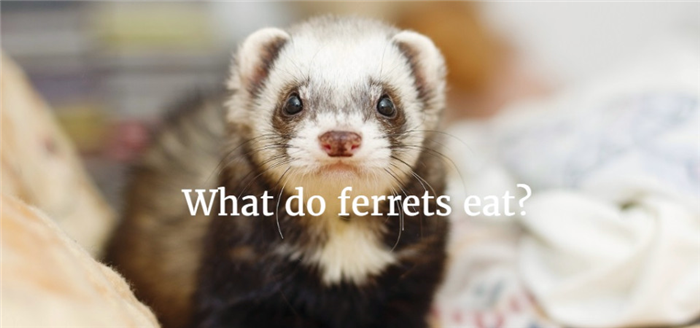
Is your ferret insured? Get a quote for up to £2,000 of vet fee cover | Insure up to 3 pets per policy | We’ve been insuring exotic pets since 1996 | Check out our customer reviews on Feefo.
What do ferrets eat?
Ferrets are obligate carnivores, which means they must eat meat.
Raw meat is the best option, including whole prey. Ferrets can also eat kitten food, as it has a high meat protein content, baby food that’s high in meat protein, and dried ferret food, that’s high in meat protein.
As an occasional treat, your ferret can also eat eggs.
A ferret’s diet should consist of 32 – 38% protein and 15 – 20% fat.
Ferrets can eat the following raw meat:
- Chicken wings and stripped carcasses
- Turkey necks
- Rabbit
- Game birds
- Pigeons
- Minced beef
- Lamb
- Offal
- Lambs heart
- Raw animal bones for calcium and for cleaning your ferrets teeth
- Chicken
- Lamb
Source: The British Ferret Club, Feeding Adult Ferrets
Ferrets can also eat whole prey including:
Source: Susan Brown, DVM, Rethinking the Ferret Diet.
Although you may not like the idea of feeding raw food to your ferret, it replicates her natural diet, meeting her nutritional needs.
Make sure you buy good quality meat, and buy any rodents from reputable retailers. Don’t be tempted to try and catch any rodents yourself, as they could contain parasites.
You should therefore be aware that your ferret might also try to hide some food for later on. This could be dangerous, as raw meat could go off, and cause food poisoning.
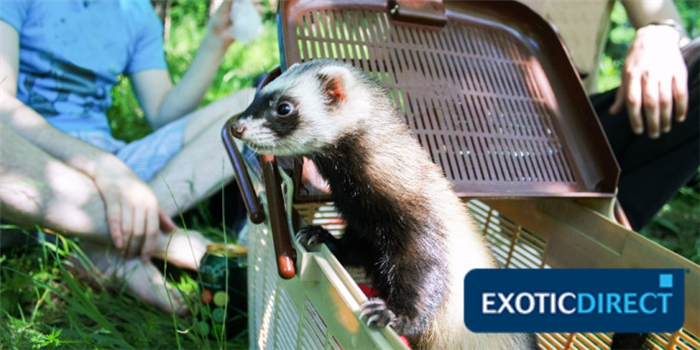
Your ferret is part of your family but make sure she eats the right food for her.
Ferret diet
Ferrets have a short intestinal tract and absorb nutrients inefficiently, which is one of the reasons their diet needs to be high in meat based protein and fat. Their bodies digest these easily, and they provide lots of energy.
You should minimise the amount of fruit or vegetables that you give your ferret. These contain complex carbohydrates which are high in fibre. Ferrets can’t digest fibre, meaning they have a low nutritional value.
A diet high in carbohydrates can also lead to disease in ferrets, as can vegetable protein that’s also found in fruit and vegetables. Find out more about foods that ferrets can’t eat and why.
Due to their short intestinal tract and high metabolic rate, ferrets must also eat little and often.
What do ferrets eat in the wild?
In the wild a ferret would eat every part of the animal including its bones, and this action would not only benefit her health, but offer stimulation and exercise her jaw.
Kristen’s ferret was very poorly in 2016. Her ferret was unable to walk and lost a third of his body weight in three weeks. She was covered by ferret insurance – read her review.
What dried ferret food can you buy?
When buying dried ferret food ensure it contains more meat protein than any other product. If it’s high in carbohydrate and fibre then you should avoid it.
Did you know that our Ferret insurance can cover £2,000 of vet fees. Cover can be per pet (up to three pets on a policy) or per policy.
Food that ferrets can’t eat
Ferrets shouldn’t eat fruit or vegetables as a main part of their diet.
Ferrets shouldn’t be fed food containing complex carbohydrates as a main part of their diet as these contain fibre. Ferrets can’t digest fibre, which means the foods have a low nutritional value.
The reason they can’t digest these is because they have no cecum – this forms part of the digestive tract in many animals, and can produce bacteria that digests complex carbohydrates.
In addition a diet high in carbohydrate can lead to an excess of glucose in your ferret’s blood. This could cause insulinoma – cancer of the beta cells in the Pancreas according to Susan Brown, DVM.
Vegetables can also contain vegetable protein, which your ferret can’t digest very well. If she eats too much then it can lead to disease, such as bladder stones, ulcerations of the skin, gastroenteritis, reduced reproduction ability and her kits could suffer with poor growth.
Try and avoid the foods listed below, as they’re high in complex carbohydrates and fibre:
Fruit and vegetables you shouldn’t feed your ferret
- Apple
- Blackberries
- Lentils
- Lima Beans
- Pears
- Pigeon beans
- Pink beans
- Pinto beans
- Raspberries
- Spinach
- Small white beans
- Winged beans
- Bananas
- Blueberries
- Broccoli
- Brussel sprouts
- Dates
- Figs
- Green Beans
- Guavas
- Kiwi fruit
- Onions
- Oranges
- Split peas
- Dried plums
- Sweet potato
- Peanut butter
- Raisins
- Rice
- Bananas
- Salt
- Chocolate
Source: Fruit and Veggies – More Matters & The American Ferret Association
Your ferrets diet should be primarily meat and fat as in the wild. She will gain her energy from those foods, and not carbohydrates.
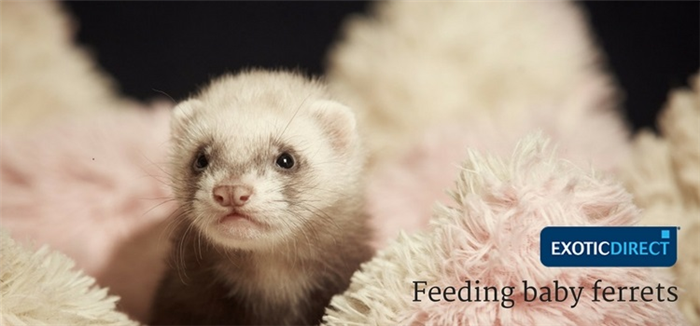
Your baby ferret’s eating habits are shaped while they’re young.
What do baby ferrets eat?
You can feed your baby ferret a combination of fresh meat, goats or low lactose milk and water.
You can feed your baby ferret around four times a day using the following plan:
- Breakfast: Water and fresh meat chucks
- Lunch: Fresh meat
- Dinnertime: Fresh meat
- Suppertime: Meat on the bone followed by goats milk or a low lactose milk
(Thanks to The British Ferret Club for their Kit dietary advice)
Ferrets tend to bond with their food as Kits, and once they’re older it’s harder to change their eating habits.
You should encourage them to try lots of different foods when they’re young, to avoid problems later on in life.
It’s also a good idea to give them soft foods occasionally, such as baby food (high in meat protein), or dried food soaked in water occasionally.
This is so they don’t reject softer foods when they’re ill, and unable to normally.
How often should I feed my adult ferret?
Opinions vary on how often, so be guided by your pet – just remember not to overwhelm her with food, as she won’t be able to eat it all.
She may then resort to hoarding it for later. If it’s a meat product this could have obvious consequences in that it could go off before she eats it.
If you work during the day, then try leaving some ferret kibble out for her to eat when she’s hungry. Alternate ferret kibble and fresh meat when you’re at home.
With all this food, you also need to make sure that your ferret gets plenty of exercise in order to prevent her from getting fat.
Can I give my ferret tap water?
Yes, tap water is fine for your ferret.
If your ferret turns her nose up at, it may be because she can smell the chlorine. Try filtering it to see if that helps.
It’s really important to provide your ferret with lots of fresh water daily to avoid dehydration. Ferrets can get thirsty, particularly if they’re eating a dried ferret food, or if it’s the summer.
Can a ferret eat dog food?
No, it’s not advised to feed your ferret dog food. This is because it’s not high enough in protein and fat for your ferret.
Dog food also contains vegetable protein and fibre which cannot be digested by ferrets, and can cause disease.
Yes, your ferret can eat kitten food, as it has a high meat protein content. Cat food doesn’t contain the same protein levels, so isn’t as beneficial for your ferret.
Ferrets can eat fish, however it’s not naturally part of their diet. Some pre-prepared ferret foods do contain fish, which may not be to every ferrets’ taste.
It’s probably better to pick a pre-prepared food that contains meat rather than fish.
What treats can you give ferrets?
You can give your ferret meat or eggs (one to two a week).
You can also feed baby food with a high meat content. Any treats should be high in meat protein. Sweet, complex carbohydrate or dairy products can be harmful.
Treats should also be in small quantities to avoid filling her up too much, due to her small intestinal tract.
If you want to give your ferret specifically designed ferret treats, make sure that they don’t contain complex carbohydrates. Some products sadly do, which can be harmful for ferrets.
Do ferrets eat nuts?
No, ferrets shouldn’t eat nuts, they contain complex carbohydrates which can cause illness in ferrets.
We can cover ferrets for up to £2,000 in vet fees. Cover can be per pet or per policy. Why not find out more?
Do ferrets eat rabbits?
Yes, it’s likely that if provide your ferret with rabbit, she’ll eat it.
If you own a pet rabbit, keep them away from each other.
Ferrets are naturally hunters of prey, and will chase down wild (and domesticated) animals that her ancestors would normally eat in the wild.
Urinary tract stones in ferrets
Calcium oxolate is the compound in stones that can form in a ferrets urinary tract. They’re very painful for ferrets, and are caused by eating plant based proteins, dog food and poor quality cat food.
The stones are most common in ferrets aged three to seven years.
And finally.
We really hope that you’ve found this article helpful. Ferrets are such cute pets, and it can be so tempting to give them foods that they seem to enjoy. However, their little bodies might not.
Like with dogs and chocolate – don’t be tempted to give in because your ferret looks cutely at you. Because you want to keep her fit and healthy.
And with the right kind of food, and the love, care and attention you’ll give her, hopefully your ferret will live a long and happy life.
Do you need insurance for your ferret? Get a quote for up to £2,000 of vet fee cover | Insure up to 3 pets per policy | We’ve been insuring exotic pets since 1996 | Check out our customer reviews on Feefo.
This article is intended for guidance only. Although we’ve done our best to ensure the facts are correct, we naturally cannot guarantee this, as we’re not vets or nutritional experts. If you’re unsure about what to feed your ferret, you should consult your vet.
News articles you might be interested in
Looking after and caring for a ferret
Ferrets are undeniably adorable creatures, and they make great pets. They are curious and playful, but also sleep for about 16 hours a day. This makes them ideal pets for people with full-time jobs, as they can be left to snooze on their own for a few hours a day. Being crepuscular, this means they are usually active during dawn and dusk.
Pros and cons of pet insurance
Your pet is a huge part of your life. You love and care for him like a child, and his well being is your main concern. You also worry about what you’d do if he became ill. How much would the vet bills be? You don’t want to stop your pet from receiving treatment, but the thought of those vet bills worries you. After all, vets can be expensive, can’t they?
How to keep exotic pets calm on Bonfire Night and New Year’s Eve
Although there won’t be any large firework displays due to Covid-19 this year, families may still have displays at home. Find out how to keep your pets safe and sound.
ExoticDirect is a trading name of Brooks Braithwaite (Sussex) Ltd. Company No. 1416900.
Brooks Braithwaite (Sussex) Ltd is authorised and regulated by the Financial Conduct Authority (FCA), our FCA register no. is 304839. fca.org.uk/register.
If you are unhappy with our service we have a complaints procedure, details of which are available on request (by telephone or email). You may be able to refer a complaint to the Financial Ombudsman Service (FOS) if you are unhappy with how we deal with your complaint. The FOS website is financial-ombudsman.org.uk.
What should your pet ferret eat?
Learn everything you need to know about your ferret’s diet.
Ferrets are cute, cuddly, playful and spunky. For many people, ferrets are great pets! If you’re thinking about getting a ferret (or you’ve just found yourself as a proud new owner), it’s important to learn all about your ferret’s diet. Keep reading to find out all the details on what ferrets should (and shouldn’t) eat in order to live a long, healthy, happy life.
What do ferrets eat?
Ferrets are strict carnivores, which means they love (and need) to eat meat. In nature, ferrets eat other animals — and every part of those animals too, including their livers, kidneys, tissues and bones. They also eat whole prey, such as whole mice, rats and chicks.
Even when ferrets are pets, they must eat raw meat, including chicken, lamb, pigeons, rabbit, turkey necks and raw animal bones. Although you might be grossed out by the thought of feeding these things to your ferret, it’s necessary that he gets this raw meat in his diet. If kept as pets, ferrets need high-quality raw meat that’s purchased from reputable places.
Is “ferret food” sold at pet stores?
Yes. If you’d rather not give your ferret raw meat, dried ferret food that contains a lot of meat protein is available to buy. If you go this route, be sure to check the list of ingredients. Ferrets can’t digest carbohydrates, so make sure that the ferret food doesn’t contain any corn or grain and that meat (such as chicken, beef or lamb) is the first ingredient.
Some ferret owners also give kitten food as a good alternative. If you do this, it’s important to feed your ferret kitten food instead of adult cat food because kitten food has a higher protein content. Also, if you feed your ferret kitten food, be sure to ask your veterinarian about feeding him extra fatty acid supplements because kitten food usually doesn’t have enough fatty acids for ferrets.
What should ferrets not eat?
Ferrets should never eat fruits or vegetables, as these foods contain a lot of fiber, which makes them difficult for ferrets to digest. Ferrets that eat vegetables usually end up with bladder stones, skin ulcerations, gastroenteritis and/or a reduced ability to reproduce.
Specific foods to always avoid feeding your ferret include fish, corn, onions, cow’s milk, apples, beans, berries, bananas, kiwi, onions, oranges, chocolate and dog food.
What are the general requirements for a ferret’s diet?
In general, a ferret’s diet should be high in protein and fat and low in fiber. This is a good goal to have for your ferret’s diet:
- 30 to 40% protein
- 20 to 30% fat
- Less than 3% fiber
How often should you feed your pet ferret?
Because ferrets have a short intestinal tract but high metabolism, they need to eat small portions very often. Most ferrets eat six to 10 small meals every three to four hours throughout the day. And, it takes a lot of food to make a ferret feel “full.” On average, ferrets eat five to seven percent of their body weight in food every day! For reference, the average size of an adult ferret ranges from one to five pounds.
Yes. You usually don’t need to worry about your ferret becoming obese. Because ferrets generally eat only until they’re full, they typically won’t gorge themselves simply because food is there.
What should ferrets drink?
The only thing a ferret should drink is fresh, filtered water. This should be left out at all times, and it should be refilled often.
Yes. Cooked eggs are great treats for ferrets.
There are also treats made specifically for ferrets. If you can’t find these, try treats specifically for cats. These should only be given about once every four to seven days. Any more than this can cause constipation, tooth decay and obesity.
Something else to note is that ferrets groom themselves and can easily get hairballs. To fight this, there are special treats that prevent hairballs from forming. It’s a good idea to supplement these treats into your ferret’s routine.
What do baby ferrets eat?
Baby ferrets are called kits. Kits usually nurse from their mother for the first six weeks of life. However, at three weeks old, kits can also begin to eat small amounts of food that are soaked in warm water to moisten the food. At six weeks, a mother ferret’s milk has typically dried up, so the baby ferret (kit) can move to a diet full of raw meat. However, until about 12 weeks of age, the food should always be soaked in warm water to make the food go down more easily.
It’s important to introduce your pet ferret to a variety of safe foods as soon as possible. Trying to introduce new foods to an older ferret typically doesn’t go well.
What if you want to change your ferret’s food?
Transitioning your pet ferret to a new food should be done slowly and gradually over the course of several weeks.
Yes. There are certain veterinarians that have great knowledge about ferrets and are trained specifically to treat them. It’s important to have your ferret examined by a veterinarian at least once a year. At these visits, be sure to ask your veterinarian about your ferret’s diet. Your veterinarian will have all of the most up-to-date information about ferret feeding recommendations.
What Do Ferrets Eat?
The ferret is one of the more unusual yet still common pets kept in North America. Members of the family Mustelidae, ferrets are long, slender mammals with distinctive blackish-brown and white fur. Most ferrets measure around 20 inches long and weigh between 1.5 to 4.4 pounds. Ferrets have been domesticated for at least hundreds of years, primarily for sport or hunting. Today, several million ferrets are kept as pets in North America alone, with many more raised as pets around the world. That said, raising ferrets as a pet is a contentious topic in some areas, with numerous states and countries banning the practice. This is usually due to the fact that escaped ferrets can wreak havoc on the local wildlife. Given their debatable status as loving pets or menace to the environment, it’s important to understand the answer to the question, “what do ferrets eat?”
In this article, we’ll take a deep dive into the dietary habits of ferrets. First, we’ll start off with a discussion of what ferrets like to eat. Then, we’ll examine how ferrets use their senses and tactics to hunt for food. Next, we’ll compare what ferrets eat in the wild versus what they typically eat as pets. Finally, we’ll end with a brief exploration of what baby ferrets eat. So, let’s get started and answer the question, “what do ferrets eat?”
What Do Ferrets Like to Eat?
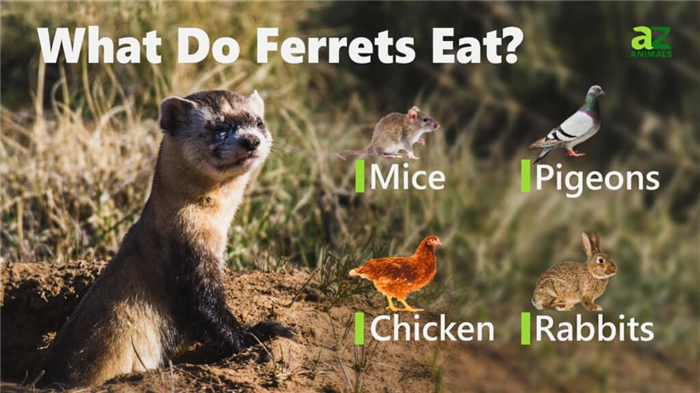
Ferrets eat a wide variety of prey including mice, pigeons, chickens, and rabbits.
Ferrets are primarily carnivorous, meaning that they almost exclusively eat animal matter to survive. While they do enjoy sweet treats and will occasionally eat plant matter, the bulk of their diet is made up of animal protein. They mostly eat raw meat, although they will also eat cooked meat as pets. While obligate predators, ferrets are also notoriously picky eaters. Ferrets tend to show a preference for certain types of food and may refuse to eat others. That being said, in the wild, ferrets will eat a wide variety of prey. Generally speaking, they’ll eat just about any type of prey that they can catch. Usually, this prey would be smaller or weaker than themselves and includes small mammals, birds, fish, amphibians, and reptiles. We’ve taken the time to compile a list of 10 foods that ferrets usually like to eat. The 10 foods include:
How Do Ferrets Hunt For Food?
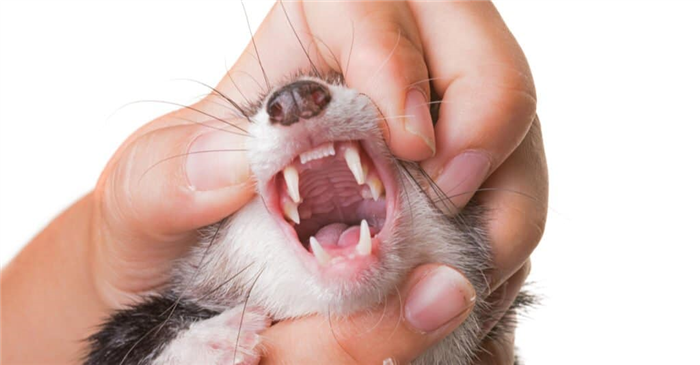
Ferrets possess sharp canine teeth which they use to kill their prey.
Ferrets possess many of the same senses as people. That said, they use certain senses more than others in their hunt for their next meal. Ferrets have binocular vision, which grants them great peripheral vision. However, they have a blind spot in front of their nose, and also struggle to see at night or in bright light. Due to their poor depth perception, they will often jump off high places not realizing how far they will fall. As a result, ferrets mostly rely on their keen sense of smell while hunting. They can discern many different scents and can detect odors from far away. Meanwhile, although ferrets possess decent hearing, they often struggle to detect where sounds are coming from. That being said, even deaf ferrets can navigate their environment just fine, thanks again to their sharp noses.
While not nocturnal, ferrets spend a large part of their day asleep. They become most active at dawn and dusk, which is when they do most of their hunting. This makes sense, given their sensitivity to bright light and inability to see well at night. When actively hunting, ferrets make use of their lean bodies and sharp teeth and claws to subdue prey. They possess four sharp canines that they use for killing prey and smaller incisors and molars for tearing and chewing food. A ferret will chase a rodent or rabbit down into its burrow, which it can easily navigate thanks to its skinny shape. Ferrets are extremely agile and can reach speeds up to 15 miles per hour. This makes them effective at chasing down even fast prey like rabbits and rodents. That said, they also enjoy an easy meal, and will readily feast on carrion.
What Do Ferrets Eat in the Wild?
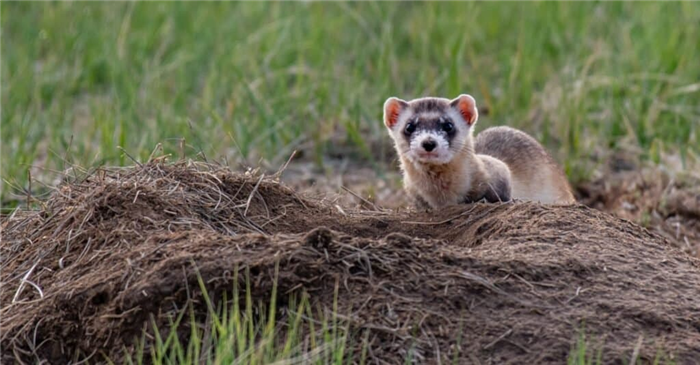
In the wild, ferrets eat a wide variety of prey including birds, fish, mammals, reptiles, and amphibians.
Ferrets are obligate carnivores, meaning that their diet is made up of at least 70% meat. Along with meat, they also eat a fair amount of bones and fat, which they need to be healthy. Since ferrets struggle to digest vegetables, particularly carbohydrates, they mostly stick to animal protein for sustenance. In the wild, ferrets will eat just about anything that they can catch. That said, rodents and other small mammals make up the bulk of a wild ferret’s diet. Common prey include rats, mice, rabbits, hedgehogs, possums, and ground squirrels. Wild ferrets will also catch small fish, as well as frogs or even snakes. They are strong climbers, and can easily scale branches to attack birds or eat their eggs. Ferrets will also prey on birds such as chickens, turkeys, or pigeons. When available, ferrets will also eat insects, worms, and even carrion.
What Do Pet Ferrets Eat?
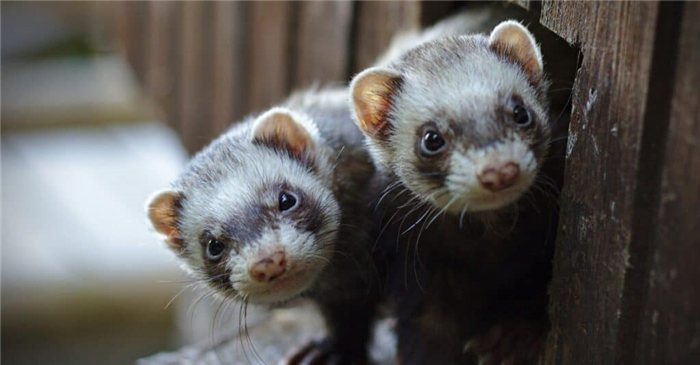
It’s best to feed your pet ferret raw meat and supplement its diet with specially formulated ferret dry food.
Many people choose to keep ferrets as pets, both as domestic companions and for their hunting abilities. If you choose to keep a pet ferret, you’ll need to know how to properly care for and feed your ferret. Generally speaking, ferrets thrive best when they’re fed live animal prey including meat, fat, and bones. That said, most pet owners opt instead to give their pet ferret prekilled, raw meat. Popular meats include chicken, turkey, rabbit, game birds, lamb, beef, offal, and organs. Additionally, many owners choose to feed their pet ferret supplemental dry food. While many owners used to feed their ferrets cat food, it’s now recommended to feed your ferret a specially created dry food formulated for ferrets. Although ferrets can eat limited amounts of fruits and vegetables, this is not recommended, as they are susceptible to gut issues and other health problems.
What Do Baby Ferrets Eat?
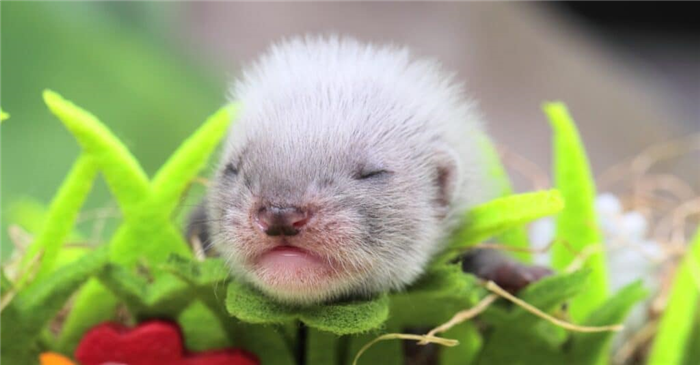
Cute as can be, the baby ferret is called a kit — much like a baby fox.
Also known as kits, baby ferrets are ferrets that are less than 1 year old. Typically, female ferrets give birth to between 1 to 6 babies. In the wild, baby ferrets rely on their mothers for survival. Until they are around 12 weeks old, baby ferrets subsist on both their mother’s milk and any food that she kills. Around 6 weeks old, the baby ferrets will begin to venture from their den and explore more on their own. Once they are old enough, they will begin to fend for themselves. When caring for a baby ferret, you’ll want to provide it with fresh meat and water. If the baby is under 12 weeks ago, you’ll want to supplement its diet with goat’s milk or a milk replacement formula. Ferret kids should eat around 4 times per day when less than 2 weeks old, and then around 3 times per day until around 10 weeks old. After that, they can eat around twice per day. Always check with your veterinarian to ensure your baby ferret is getting enough to eat.
More about feeding your ferret
All ferrets are obligate carnivores – this means they need animal protein to survive. They also require high amounts of fats, higher than other common pets such as cats and dogs. Many ferret owner choose to provide this nutrition via pelleted ferret food, which should contain a meat source such as chicken or lamb as the main ingredient (not fish). If you have a choice, smooth, small chunks are easier for your ferret to eat than more angular pellets and ideally a pelleted food will contain 32-38% animal protein – don’t be afraid to check the back of the bag and make sure you are getting what your ferret needs.
Another option for providing the protein your ferret needs is with kitten food. This has high protein, and is a suitable base diet for ferrets, although they will need extra fatty acid supplements as kitten food does not provide enough of these for ferrets. Cat food has less protein content than kitten food, so kitten food is much more suitable.
Dog food has far too many carbohydrates in and is just not suitable for the ferret digestive system.
You can top up your ferret’s protein, and provide a bit of fun, using supplementary cooked meat sources such as pieces of chicken, cat treats and cooked egg as treats. This is great for them, and offering a variety of food from a young age will make your ferret much more open to a range of foods – starting an older ferret on a new food can be difficult, if not impossible.
Ferrets have a very high metabolic rate, and a short digestive tract. This means they process their food very quickly, and need to eat little and often. Ideally ferrets will eat 6-8 times per day. This can be difficult to manage with discreet feeds, so leaving pellets out for your ferret throughout the day will allow them to eat at will. Don’t be afraid to hide the food or make it a little difficult to get to – mental stimulation is great for ferrets and there is nothing wrong with making them think!
There is no reason you cannot cook your ferret fresh meat meals at home, rather than purchase commercial ferret pellets, so long as they are getting enough protein and fats. To avoid the risk of disease, cooking meat thoroughly before offering it to your ferret is recommended. There are disadvantages however. Ferrets need to eat 6-8 times per day due to their high metabolic rate, and leaving meat in their cage might be messy. Pellets also help keep your ferret’s teeth clean, an advantage not seen with home-made diets.
How much a ferret needs to eat depends on:
- Age
- Weight
- Activity level
- Reproductive status
- Health status
- Base diet
Usually free-feeding is best for ferrets, but you may find you need to restrict their daily intake if they are becoming overweight.
Baby ferrets, or kits, will nurse from their mother for approximately six weeks, but they can be offered small amounts of food soaked until soft with warm water or broth from three weeks old. Over a week, gradually decrease the amount of added liquid, until you are offering the kits only solid pellets alongside their mother’s milk. During this time, replace any uneaten damp food with fresh after a few hours – young kits may start to toilet in the damp food otherwise, which can harm toilet training and will also affect your gill’s food consumption as she won’t eat soiled food unless forced. As your gill’s milk dries up, your young kits should be ready to move onto a dry diet. As well as the base pellet diet, offer a variety of safe foods to kits to try, as ferrets who are not exposed to a range of food types when young are much more likely to outright reject those food items when older.
Ferrets are well designed to digest fats and protein, but struggle with carbohydrates. A lot of sugar has also been potentially implicated in the development of insulinomas in ferrets. This means sugar is off the menu.
- Vegetables – especially hard vegetables such as carrot, which can also block their digestive tract, and avocado. which is poisonous to ferrets.
- Fruit – These are very high in sugar. Grapes/raisins are also toxic to ferrets.
- Dairy – As well as being high in sugar, ferrets lack the enzyme required to digest dairy products.
- Sugary treats – If you want to give treats use ferret or cat treats, or use fresh meat or cooked egg. Some meat-based dog treats may be suitable, but many are carbohydrate heavy and can upset ferret digestion.
- Chocolate – As well as being high sugar, chocolate is toxic to ferrets.
Other items that should also be avoided in ferrets are:
- Cooked bones – These can splinter and seriously damage your ferret’s digestive tract.
- Dog and adult cat food – These do not contain enough protein for ferrets.
- Xylitol – This sugar-substitute is also toxic for ferrets, so don’t assume something low-sugar is safe for ferrets.
Ferrets can be very fussy where food is concerned, and if they don’t identify a food type as edible early on, it can be difficult to get them to take to it. Changing a ferret’s diet should always be done slowly and carefully – add a little more of the new food item, and take away a little more of anything you want to replace, every day. This slow transition can take several weeks, but patience will be worth it. Ferrets can be very stubborn and cannot be starved into eating something they don’t want.
